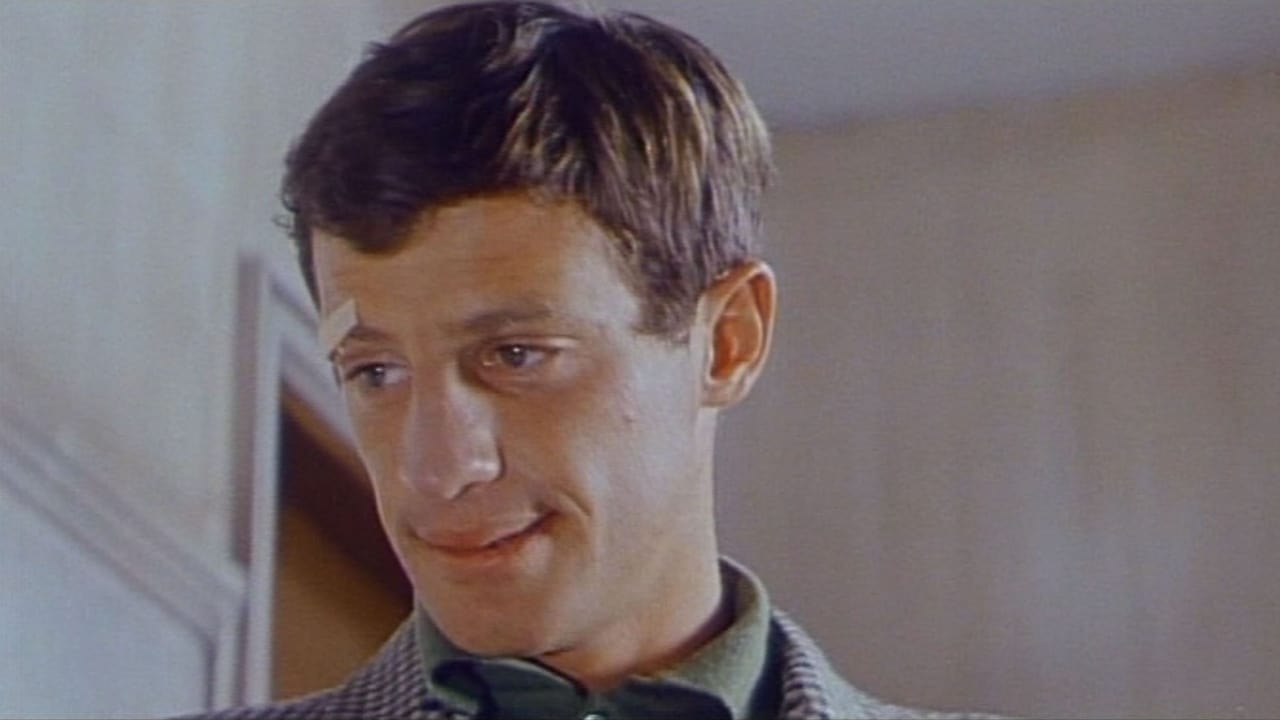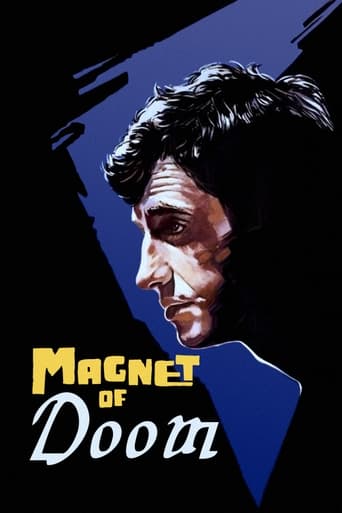

Too many fans seem to be blown away
... View MoreThis is a small, humorous movie in some ways, but it has a huge heart. What a nice experience.
... View MoreClose shines in drama with strong language, adult themes.
... View MoreA terrific literary drama and character piece that shows how the process of creating art can be seen differently by those doing it and those looking at it from the outside.
... View MoreAs some of the other reviews have already stated, the print of the movie that is available is very poor. So it is not quite clear whether Melville wanted to have the washed-out look of the picture or whether it is just plain bad quality. Even rare TV screenings do not offer an improved version (ARTE). The relationship between the young ex-paratrooper/boxer/secretary (Belmondo) and the old bank owner/colonial adventurer (Vanel) is quite interesting and also stands for the generational conflict of the 1960s. Obviously, some of the plot is somewhat stretched but the tension between the main characters is excellently played out. Melville wanted Spencer Tracy for the Vanel part, but Tracy's health situation made any form of outdoor filming (not to mention insurance for this) Impossible. Belmondo, who is fooling around in Godard's "Breathless" and posing as a Bogart style tough guy, really plays a film noir character in this one. The way he treats his girlfriend at the beginning of the movie makes his protagonist almost unlikeable. In the damp Louisiana setting at the end of the movie, the whole affair really turns into a veritable noir.
... View MoreAdapted from a Georges Simenon novel, Magnet of Doom (why it's called that I don't know, though the American DVD I watched had the title An Honorable Young Man) is about a young amateur boxer and ex-military man (Jean-Paul Belmondo, the cool tall smoking male of the Nouvelle Vague) who becomes a 'secretary' to an older white collar criminal (Charles Vanel) who had to leave France fast. Instead of going to Venezuela, like one might think is most logical, they head to America, first to New York and then, following a brief road trip, New Orleans.This is where most of the story takes place - which is mostly just watching their relationship disintegrate and thoughts about taking-the-money-and-running for Belmondo (yeah, Vanel has a big stack of cash that he had to take out of his security box in New York before the feds got wise) - and it's not bad. If there's a problem it's that by the time one comes to this movie, which I didn't really know about until recently (it only got released on DVD last year I believe, and aside from a NY Film Festival screening fifty years ago it never got a release stateside), one has probably/likely seen all of Melville's other films. And it's not a major work.Or, if it is, Melville doesn't really have a lot of energy to make it more than just an interesting B movie, no more no less. It is actually a "crime movie" if you think about it, just different because it's not about a heist or guys in trench-coats, but about an older man trying to out-run the law and... himself, I guess.Belmondo and Vanel make up most of the heart of the picture and keep it fascinating. You want to know what each one will do next - Ferchaux needs Michel more than he needs him - amid the sweltering heat and the old man's boy-cry-wolf physical ailments. And Melville cast his two leads well. So well that it helps, a little, to distract from portions that don't work dramatically or feel dated. There's a mid-section in the film while they're on their cross-country trek that Michel stops (rather suddenly) for a female hitchhiker, and they quickly become lovers (?) in one of those Movie-Fantasy-Scenes where right after they pick her up they stop and Michel and the young woman have a swim and kiss and then... at the next stop she tries to run away with another truck driver (?) It's something like that where Melville, whether it's through himself or Simenon's text, shows a bit of sexism, or just not knowing what to do with a female character that could have become a fully developed character or a love interest (and there IS a love interest, sorta, later in the movie in New Orleans, though I wonder if this is also an excuse to just show a woman practically naked while Michel sits drunk). It's not a criticism I'd like to make against the director but I do; he has his two main male characters fully developed, and the actors inhabit them well enough, that it disguises that everyone else in the movie has not much dimension at all. Well, maybe the bartender has a little as a mean-looking-dude of a sort.But Melville's love of America comes through and that helps a bit. And it's interesting to see him work in color for the first time, though ironically I think I prefer when he has his more subtle, washed out and blue-ish colors in later movies like Army of Shadows and The Red Circle. Here things are bright enough (hard to tell fully from the non-Amamorphic DVD transfer), and he gets the local color about right even as it's all shot, oddly enough, in his studio in Paris (what, you thought he'd trek out to America to shoot this? Heavens no, though I'm sure a second unit for the rest of the footage).An Honorable Young Man/Magnet of Doom has an intriguing performance from Belmondo, in terms of 'what will he do next', and some good cinematography. But there should've been a little more 'there' there, past the male camaraderie and themes of loyalty (which, yes, it's fine and well drawn enough).
... View MoreI must confess I was terribly excited at the prospect of Jean-Pierre Melville tackling the road movie. If a director was ever suitable for taking on his back the existential baggage usually associated with that particular sub-genre, that's old Jean-Pierre. But in the same time, nine out of ten times there's a reason why certain films of a director's ouevre receive all the plaudits while others tend to languish in obscurity. Simply put, Magnet of Doom is not among Melville's finest - probably not his worst either. It's just too awkward and clumsy to ever be truly successful from an artistic or technical standpoint and even though fans of the director will take pleasure in witnessing the early nurturing of those same ideas, themes and moods that would later transform into what became his signature style, Magnet of Doom lacks the singularity of purpose and stylistic confidence of something like Le Samourai. Melville weaves the plots of two characters, an amateur boxer scraping to get by after his boxing career goes down the drain and the stalwart, rich businessman on the run from the law (presumably for someone's murder) who hires the first as his secretary and travel companion, into a road movie that takes us all the way from the petit bourgouisie cafes of France to Manhattan to the Deep South and bayous of New Orleans. If you can forgive the wooden delivery and stilted dialogue American non-actors are saddled with, the choppy editing, the occasionally clumsy and haphazard camera-work, there's quite a few things to appreciate. Melville's guerilla tactics as he samples New Orleans nightlife with a camera shooting from the open car of a moving vehicle, the documentary style of his footage of empty highway stretches, slick diners, smoky bars and neon motel signs, small parts of a puzzle that in clicking together form a different kind of Americana. One seen through the eyes of a European not necessarily fascinated with what he sees. If the boxer's fixation on Frank Sinatra, the son of Italian immigrants much like himself, symbolizes the mythic quality of the New World, a motley assortment of thieving hitchhikers, soldiers spouting racial slurs and opportunist, murderous bar owners reveals the seemy underbelly of the American Dream.Behind the slow-burn atmosphere however, behind the minimalism of the plot, the sparse dialogue, the intimacy of the monologues, all typically Melvillesque ideas and themes that would later resurface in a more refined, surefooted form, there's not much of a story to speak of. Not only is the plot stretched pretty thin, not only does it suffer from one too many improbabilities (not plot holes necessarily but little distractions that accumulate in the course of time) but it's handled in a somewhat awkward manner. The gradual shift of power in the duo's relationship, as one learns to experience freedom and the other comes to term with solitude, is not enough to carry the dramatic weight of the plot and beyond that there's not much of anything. And if Belmondo's character redeems himself in the finale for being a conniving, self-serving scoundrel for most of the film, he has the show stole from right under his nose by by the great Charles Vanel (Les Diaboliques, Wages of Fear, To Catch a Thief) who gives another terrific performance.
... View MoreI saw this at London's National Film Theatre a couple of nights ago. The print, the best they could lay their hands on, was scratched and the colour had faded to the extent that much of it was a pinky sepia. Also, I could find very few reviews to read beforehand (zero on the IMDB). So I wasn't expecting much.And I was therefore very pleasantly surprised. The tale of an old crooked banker who absconds to the US with a young male golddigger really works. Charles Vanel (who was so brilliant in The Wages of Fear) and Jean-Paul Belmondo are a wonderful team, as a very spiky and spiteful Father/Son relationship grows between them.As a travelogue of a journey from New York to the Deep South it's fascinating, and reminded me, of all things, of Easy Rider, which I very much suspect it may have influenced.There's a few problems with it, mainly due to the fact the Jean-Pierre Melville never really got the timing right when it came to editing emotional scenes (especially at the end).But if you're a fan of the early Melville movies, Le Doulos in particular, then check it out.
... View More